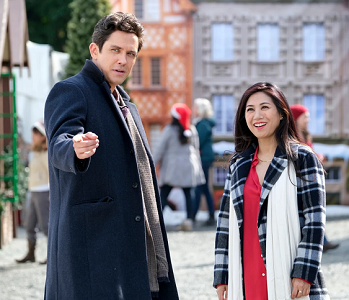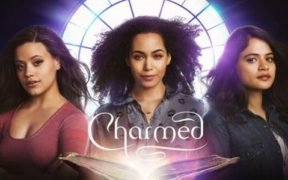TV Interview!

Interview with Liza Lapira, Neal Bledsoe, Nathan Witte and Mark Amato of “Must Love Christmas” on CBS by Suzanne 11/3/22
This is a cute little Christmas movie. I’d never seen Neal Bledsoe before, but he reminds me of one of my favorite actors, Dan Stevens. Liza Lapira has been on many TV shows I’ve watched, such as NCIS, so it’s nice to see her starring in this. She does a great job as a stressed-out romance novelist. I’ve chatted with Nathan Witte before, and he is truly great in this role as Liza’s past boyfriend. The plot sounds a bit like your standard Christmas movie, but it has a nice twist. Mark Amato, the writer of this film, has written many Christmas movies before, so he knows how to take the formula and tweak it a bit.
Enjoy the transcript of this panel! I’m asking question #3…I mispronounced Liza’s name, but she was super nice about it.
CBS 2022 HOLIDAY PROGRAMMING PANELS
MUST LOVE CHRISTMAS
Liza Lapira
Neal Bledsoe
Nathan Witte
Mark Amato, Writer
Virtual via Zoom
November 03, 2022
© 2022 CBS. All rights reserved.
NOELLE LEWELLYN: Hi, everyone. I’m Noelle Lewellyn and on behalf of myself and my counterpart, Eric Freilich, we’d like to welcome you to the panel for our CBS original movie, Must Love Christmas. We will be presenting you with festive panels today for all three of this year’s holiday films.
“Must Love Christmas” premieres Sunday, December 11 on CBS and will be available to stream live and on demand with Paramount+, and the movie stars CBS’s very own Liza Lapira of our hit drama series “The Equalizer.”
The movie is a charming holiday tale in which Liza plays Natalie, a Christmas romance writer who becomes involved in a love triangle and finds inspiration, both personal and professional.
I would like to welcome our panelists, Liza Lapira who plays Natalie. Our movie screen writer, Mark Amato. Neal Bledsoe, who plays Nick, and Nathan Witte, who plays Caleb. And I think I spoil nothing by saying Nick and Caleb are Christmas contenders for Natalie’s heart.
Before I hand the virtual mic over to Mark for some opening words, just a reminder that if you’d like to ask a question, please raise your hand in the chat feature and I will call on you by your screen name when it’s your turn.
Now over to Mark. Mark, if you’d like to say a few words.
MARK AMATO: Yes, thanks. Writer’s block is a crippling disorder that haunts every writer, present company included. Even with dozens of Christmas movies that are under my belt, you sit at a computer and the words aren’t coming. Or worse, they’re coming, just not any good.
So just a plug for our movie Must Love Christmas. Natalie Wolf is America’s reigning queen of Christmas romance. Her novels have earned her legions of fans so much so that our hopeless, hopeless romantic rarely leaves her New York apartment these days.
Until, that is, our recluse finds herself in the cross‑hairs between a horrible case of writer’s block and a looming Christmas deadline. So to shake things up, she takes a tiny step out of her comfort zone for a quick road trip to Buffalo, the town that inspired her very first Christmas novel. But when a freak snowstorm leaves her stranded on the side of the road, Natalie’s world is about to turn upside down when the tow truck driver, who comes to her rescue, happens to be her very first high school crush, an inspiration to the lead character in one of her novels.
Stuck in an idyllic small town that looks ripped from the pages of a Natalie Wolf classic is where fiction and real life collide, but if Natalie is brave enough to take a leap of faith, turn the page, she just might find her own happily ever after.
QUESTION #1: Thanks, Noelle. Nice attire today, by the way. (She was wearing a VERY festive Christmas sweater!)
Liza, my question is for you, actually two questions. Number one, is there something very particular in your mind about being a lead in a Christmas movie specifically. And, number two, I don’t know if there’s also an “Equalizer” episode that night, but if there is, do you get a kick out of the idea that that will lead into this?
LIZA LAPIRA: I do. I’ll take the second one first because that’s first and foremost in my mind. I am really excited for viewers to see me play one vastly different thing one week and then ‑‑ I don’t know ‑‑ couple weeks later or the next week to see this just 180 in terms of a personality shift.
Yeah, this character is ‑‑ Mel, the character I play on “The Equalizer,” is much more self‑assured, to put it mildly, and much more aggressive than Natalie in this movie so that ‑‑ I get a kick out of that.
And then, yeah, it’s really special for me to be the protagonist in this kind of movie because I’ve been a fan for so long. And, you know, on a separate note, it’s special for me to be a protagonist in something. When growing up I didn’t see many protagonists that look like me so this has just been a doubly wonderful, wonderful thing for me to be a part of.
QUESTION: Thank you.
QUESTION #2: Mark, you have a lot in common with the character. I mean, you write books and you write movies, but it’s the same thing. So I was wondering, do you sometimes feel that same thing of falling into a trap, you don’t want to have the guy saying my candy coated dreams, things like that.
What are the things you want to avoid when you’re doing a movie and what are the things you’re really trying to have?
MARK AMATO: The truth is it’s sort of like ‑‑ there are so many tropes that you have to kind of sort of like find a way to recycle and I don’t want to recycle. So sort of like, you know, I always get like my critics would say, you know how it’s going to end, sort of in the royal matchmaker. You see two characters. We know they’re going to be together in the end. I said but do you know how. You don’t know how.
So the last act right before you come back, I guarantee no one is going to be able to predict the ending, and for me that becomes the biggest challenge because if I get to a situation where it feels a little too comfortable and a little too easy, I haven’t tested myself so each one I hope to get better and better.
QUESTION: Cool. Thanks.
QUESTION #3: Hi, yeah. It’s great to talk to you guys. My question is for Liza. What is your favorite holiday? We know what your character’s favorite holiday is, obviously.
LIZA LAPIRA: Yeah, it’s Liza. It’s Lisa with a Z.
QUESTION: I’m sorry. I’m sorry.
LIZA LAPIRA: No, everybody ‑‑ I’m sorry. My mom couldn’t figure out Ss. It’s a whole thing I have with Mrs. Lapira. It has nothing to do with you.
But, yeah, I’m in line with Natalie. Christmas is pretty much up there. It’s a time for family. I come from a very, very big one and it’s the one holiday of the year that we all make the trek to, you know, the main home and congregate and eat and drink and eat and eat. Lots of eating.
QUESTION: Thank you.
QUESTION #4: Yes. Thank you. It’s a question for both Mark and Liza. One of the main stakes of these kind of movies, two of the main stakes are the meet cute and then the final decision, the kiss or whatever it is.
And, Mark, in your case of writing that, which one is harder to do to make sure you don’t fall into the tropes?
And, Liza, which one of those is easier to play and which one is more difficult?
MARK AMATO: It’s interesting because it’s sort of like in my mind I know what I need to do so it’s sort of I kind of reverse engineer. I go to the first place where they meet. I think okay, well, how am I going to dove that tail to the middle and end, and that ending ‑‑ that ending completely predicts or dictates to me how I’m going to get these two characters to clash.
And the way I describe it is the two characters, they really are sort of like better if you squeeze them two together they make one really, really good character so that’s how I create sort of like that meet cute.
Liza, take it.
LIZA LAPIRA: Okay. Meet cute versus the end ‑‑ well, if the actors I’m working with and the scripture working with and the director you’re working with is great, then they’re both pretty easy and both pretty fun to play.
For this movie in particular, I enjoyed ‑‑ I had two meet cutes. I enjoyed both of them immensely. Yeah. I like ‑‑ I always enjoy a meet cute. You know I got ‑‑ I got both kinds of meet cute. I got the meet cute with the high school crush, the guy in my dreams that I haven’t seen in forever, the unrequited love re‑meeting meet cute, and then I got the antagonistic banter witty meet cute so I’m thoroughly spoiled by this movie. Thanks, Mark, and Neal and Nick.

QUESTION #5: Hi. Thanks for doing this. Question for Mark, but also for anybody who wants to answer. I was curious to know if the concept of a novelist who strictly writes Christmas romance, if there was anyone in particular that inspired that?
And if any of you have a favorite romance writer who does primarily holiday fare.
MARK AMATO: I can’t believe anybody wants to talk to me. I’m just the writer. But certainly the inspiration for this movie for me was “Romancing the Stone.” You know are you Joan Wilder, the Joan Wilder, and my version for this was sort of like, if you had somebody who was so completely introverted, who’s just lived in her novels and the occupational hazard that that would create. And then put them into essentially a world where, wait a minute, you’re living out the fantasies that you create and that’s what happens with Liza’s character.
And I really would like Neal to talk for five seconds at least because you create that ‑‑ the opposite side of the meet cute because it really is sort of like a love triangle. So how is that to play?
NEAL BLEDSOE: Fantastic. I guess that would be the meet ugly that we — our meet is anything but cute, but the good news is that we have nowhere to go but up from there. It’s definitely for the holiday romance films that I’ve done it’s definitely a different way to meet a leading lady, but I think it makes the payoff at the end that much more wonderful and unexpected.
LIZA LAPIRA: I agree with Neal. I loved ‑‑ the thing I loved about our romance, without giving too much away or giving it all away, you guys won’t say anything, is the ‑‑ you know after the sort of antagonistic meet the audience gets to see a friendship develop and then it blossoms into a romance and I really enjoyed that.
You know both these characters, I thought about it, both of the leading men in the love triangle helped this character grow just as friends. She confronts like a traumatic thing that happened years before this movie takes place and she gets to not only confront it, but step out of the shell that she’s been living in and ‑‑ and leap ‑‑ leap into her life as an active participant.
The other thing I’ll say, Mark, is that you said I was playing you at the ‑‑ we had a pre‑meet before I signed on and he said, yeah, all she does is write Christmas romance novels. Basically you’re playing me. And I said, sir, it is my honor and my privilege to be you.
MARK AMATO: Thank you so much. It’s the truth though only I’m super extroverted so I’m not afraid of getting out of my shell. But, yeah, you totally were. I mean, this is what I do all day. And every time I do, it’s sort of like, okay, I finished this one. There’s not another Christmas movie to be told. Hey, wait a minute, what if. So thank you.
LIZA LAPIRA: And the other thing I’ll say is to speak to Mark’s point, she did ‑‑ she is an introvert and it’s for a reason and it’s crafted in the script so it was fun to play and relatively easy to play someone who had like a humiliating public social mediaish thing happen and kind of be traumatized by that in a little way, and that’s so relatable now because, I mean, I feel like that happens every five seconds someone is embarrassed by something they say and then have to get over that trauma, and but not everybody has two handsome guys to help them get through that trauma so that was worth it.
QUESTION #6: Yeah. Liza, do you remember when it first occurred to you that you wanted to be an actress and what did your parents say?
LIZA LAPIRA: It was a circuitous route because I came out of the womb singing. I was like the 3‑year‑old that mom would pick up on the counter and be like entertain and so I was just singing and dancing, and then I thought that that’s what I was going to do so I started doing musicals. And then I thought, you know, then I started wanting to do plays without music. I wanted to do straight plays and then it segued into film and TV.
Funnily enough, I think my parents — with the singing, because it was so obvious, they were along those lines. “And get your law degree too, Liza. But clearly you have some ability there, so do that.” Acting was a bit of a shock and they eventually ‑‑ they came around in their own ways. They were never not supportive. If anything, they were just fearful.
And I think for dad it was ‑‑ it was NCIS that he was like, all right, my girl. Like re‑runs to this day and he’s like, yep, that’s my girl. And I think mom I physically, physically had to take her to sets for her to see and she was like, oh, okay this is a job, not only is this a job, it’s a good job and it’s a job with an army of people. Like it’s not just you and a camcorder. It’s like an army. It’s like a team and you’re all a team creating this thing, and that really crystallized it for her so now we’re one big happy family.
NOELLE LEWELLYN: Thank you. Thank you both. “NCIS,” saving families nationwide globally. Actually, I have a question for Neal and Nathan. The both of you are pros at this genre. I’m just wondering, how is it ‑‑ how was the experience of filming Must Love Christmas and was it different? How was it different in any way from your previous projects knowing that you guys have done some of these before?
NATHAN WITTE: Yeah, sure. I’ll just tip my hat to Mark, of course. It’s always the script that reels me in right away, and what I loved about this script is ‑‑ that’s kind of contrary to a lot of other Christmas scripts that I’ve done is that this meet cute that’s happening in this love triangle it just ‑‑ it feels like it happens around Christmas as opposed to like we’re going to do Christmas and shove this ‑‑ this triangle into Christmas.
What I find in a lot of scripts, they’re just — every scene it’s like we got to just let everybody know that we’re doing Christmas in this movie, and every scene you’ve got bells, mistletoes, shirts and sweaters, and everything, cookies. And what I loved about this script is that it was much more nuanced and had its moments of subtlety, but then it had its moments of grandeur Christmas, which I think it allowed to bring up that — Christmas in those moments and make it a lot more special.
And I love the nuance between my character and Neal’s character going after Liza’s character because it really reminded me of ‑‑ I don’t know if anyone else has seen it, but “This Means War,” and I found that to ‑‑ is one of like my favorite romantic comedies and I just tipped that one right next to that just with the sprinkle of Christmas on it so I had a tremendous amount of fun with Neal and Liza.
NEAL BLEDSOE: That’s well put. I think for me, and I just watched the film actually last night, and it was the first time coming back to it since we shot it and I think the thing that stuck out for me the most was that this really allowed the people themselves to be real and the obstacles that they were overcoming to be real, and so often in the Christmas film landscape the problems of the people are eroded away to absolutely nothing. They don’t have any obstacle to overcome. It’s just like oh my god, I do love Christmas, wow. And there’s no ‑‑ there’s no hurdle to overcome so I think there’s no ‑‑ and therefore there’s no catharsis to ‑‑ for these people to learn any lesson and so it feels, in other words, in many of these things that I’ve done it feels that the force ‑‑ the plot has been forced upon them rather than these characters coming to these realizations themselves.
And to kind of go back to something that Liza said, which is that these characters all teach something to each other and because of that there’s this extraordinary human web in this film that at first blush you’re like how are we going to make this work, but it really is that all of these characters are working in triplicate to really feed off one another and therefore they come across as so utterly human in a way that I don’t think I’ve seen in pretty much any other Christmas film that I’ve been in. And that’s fine. I think that’s the genre of those other networks and those other films, but this really felt like the most human of Christmas films I’ve done.
NOELLE LEWELLYN: Thank you, both. That’s really great to hear about that it feels more human and hear about that nuance. We appreciate that.
QUESTION #7: Absolutely. This is for Nathan, Liza, and for Neal. When you go back to where you came from, sometimes the things that you thought were special turn out to be not so special, if ‑‑ if you get my nuance here.
When you have a childhood crush or a teen crush or whatever and you go back and you meet that person let’s say at a high school reunion, they are never what you thought they were. And this is not saying anything against you, Nathan, or the character that you play, but ‑‑ but what has that experience been like for you and what did you ‑‑ what informed the character that you played in this?
NATHAN WITTE: For myself, this — I feel like that Caleb and Natalie didn’t really get to connect back in high school and I feel like Natalie remembered Caleb more than Caleb remembered Natalie. And for Caleb, Natalie turned out better than, in his mind, what she was back in high school and I think that was in part because he’s ‑‑ he was totally enthralled in the school popularity and sports and ‑‑ and going after any chick that was kind of willing to put themselves in his way, and it was kind of the recognition of Natalie coming back again. It was like a refresher, a nice reminder because Caleb going through his difficulties and being in a small town. And if anyone knows what it’s like being in a small town there’s not much of a selection. And so having somebody that is not only way better than you thought she would have turned out to be come back into town, it’s kind of like a refresher, almost like opening up a brand-new present. And I think it was a little too far ahead for Caleb because he’s still dealing with a little bit of his adolescence that kind of gets in the way.
QUESTION: Liza.
LIZA LAPIRA: Yeah, Caleb to me is this shiny, glittering illusion. You know there’s ‑‑ there’s ‑‑ her projection and I don’t even think he plays into it because that sounds manipulative. I think he’s just a charming guy. I’ve got guys like this in my family and he’s just a charming guy and he is who he is. Like even at the end of the movie you don’t hate him. He’s just that guy that does that thing and he has his own love story and has his own, you know, he has his own life.
But as far as going back, I think in high school Caleb probably was the same in that he’s just this charming illusion, this dream guy, and he’s going to live his life and have fun. And I think the only difference between the Natalie/Caleb dynamic or, I should say, Natalie’s relationship to Caleb in high school and in present day is she has more access now. They were close as friends back then and, you know, of course she’s had success in her career. They’ve lived and had their careers and their lives, and now she has access and agency and so she can see that illusion up close. And, unfortunately, she doesn’t until, you know, she gets the help of her new friend, played by Neal.
QUESTION: And Neal.
NEAL BLEDSOE: Well, Howard, if I understood your question right, part of it is about what ‑‑ when we get what we wanted when we were children, when we get that as adults, how is that payoff different. Do I have that right?
QUESTION: Absolutely.
NEAL BLEDSOE: So I think that’s a really insightful question. Thank you for asking it. I think that would ‑‑ that certainly plays itself out in ‑‑ in their love ‑‑ in their love story and what happens to this thing. Do we find it as valuable, in other words, as adults as we did as children and I think that that is such a profound question. It’s something that I could ask myself about acting. It’s something I could ask myself about really kind of anything because who we were as children and why we needed those things that we thought would make our lives complete or thought we would make us the best version of ourselves, those things inevitably change as we become older and if they don’t that speaks to a certainly kind of regression of who we are as adults.
So, yeah, of course. And I think in attaining those things that we so desperately wanted as kids, once we get them as adults we’re allowed to re‑examine them and say like, wow, this actually doesn’t matter as much and I am ‑‑ I am whole without this thing. They become totems and the totems then perhaps become illusions.
QUESTION: Very well spoken. Yes, very, very good.
NOELLE LEWELLYN: Thank you, all. Thank you, Howard. And that is actually the time we have for today. I would love to thank all of our panelists and all of you for joining. We are really grateful. And we are going to say goodbye with Liza who has a few final thoughts.
LIZA LAPIRA: Okay. Oh, I see me. I don’t want to see me. Telling myself. Everybody, I’m just ‑‑ thank you for being here. I hope you guys enjoy the movie. I hope you see it. I can’t wait. It’s a joyous, fun ride and there’s some sweet relationships in it and I ‑‑ I can’t wait to hear what everybody thinks.
And on a personal note, it has just been a career highlight and a thrill to lead one of these movies. As I said, I’m a big fan of this genre and ‑‑ and, as I said, again, it’s been a thrill to be a protagonist, period, but then a protagonist in this great story. And coming from someone who didn’t see many protagonists growing up, this has just been an embarrassment of riches. And the fun that the cast and I and the crew and the collaborative nature of making this is apparent on screen, and I am ‑‑ I’m very, very proud of that. And I hope you all enjoy it.
NOELLE LEWELLYN: Thank you, Liza. We really appreciate that. Thank you, everyone. Please stay tuned. Our panel for the CBS original movie “When Christmas Was Young” is up next.
MORE INFO:

CBS ORDERS THREE NEW ORIGINAL HOLIDAY MOVIES FOR 2022
Award-Winning Musician Sheryl Crow to Executive Produce and
Write the Title Song for “When Christmas Was Young”
“The Talk’s” Amanda Kloots to Star in and Executive Produce “Fit for Christmas”
Prolific Holiday Film Writer and Producer Mark Amato to Pen
“Must Love Christmas”
CBS announced today that it has ordered three new original holiday movies to air in December 2022.
Award-winning singer-songwriter Sheryl Crow will executive produce and write the title song for WHEN CHRISTMAS WAS YOUNG, a Nashville music-themed movie from a script by screenwriter and bestselling novelist Robert Tate Miller (“Hope at Christmas,” Forever Christmas). The story follows a headstrong music manager in desperate need of a hit song for his last remaining client, who finds himself falling for a gifted singer-songwriter with abandoned dreams of making it big, as he attempts to secure the rights to a Christmas song she wrote years ago. Tom Mazza, David Calvert-Jones and Karen Glass (Everywhere Studios) will executive produce, together with executive producers Shawn Williamson and Jamie Goehring for Lighthouse Pictures.
THE TALK’s Amanda Kloots will star in and executive produce FIT FOR CHRISTMAS from writer and executive producer Anna White (“Christmas Wonderland”), the tale of Audrey, an enthusiastic Christmas-obsessed fitness instructor at a beloved, financially beleaguered community center in quaint Mistletoe, Mont., who begins a holiday romance with a charming, mysterious businessman, complicating his plans to turn the center into a more financially profitable resort property. The movie will be produced by Brad Krevoy’s Motion Picture Corporation of America.
Mark Amato, who has created a dozen holiday-themed films, including last season’s CBS Original movie A CHRISTMAS PROPOSAL, as well as “A Kiss Before Christmas,” is writing MUST LOVE CHRISTMAS. In it, a renowned romance novelist famous for her Christmas-themed books finds herself snowbound in the charming town of Cranberry Falls, where she unexpectedly becomes involved in a love triangle between her childhood crush and a reporter determined to interview her to save his dying magazine. The movie will be produced by Brad Krevoy’s Motion Picture Corporation of America.
In December 2021, the CBS Original movies “Christmas Takes Flight” and “A Christmas Proposal” were the first original holiday television movies to air on CBS since 2012, and the newest additions to CBS’ longstanding holiday programming slate, which includes family-favorites like The Thanksgiving Day Parade on CBS and the annual broadcasts of beloved animated classics, including “Rudolph the Red-Nosed Reindeer” and “Frosty the Snowman.”
Proofread and Edited by Brenda
Back to the Primetime Articles and Interviews Page


